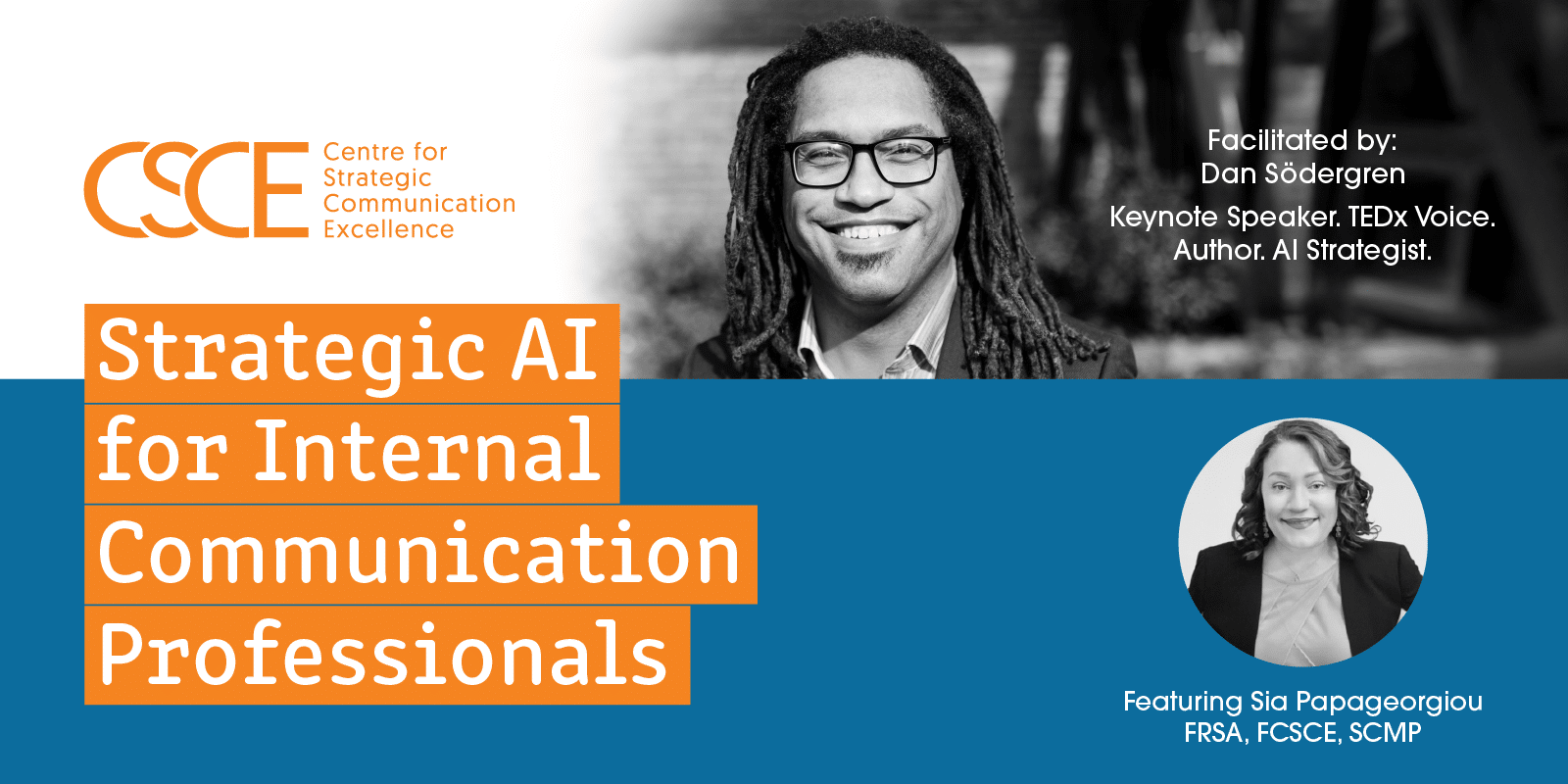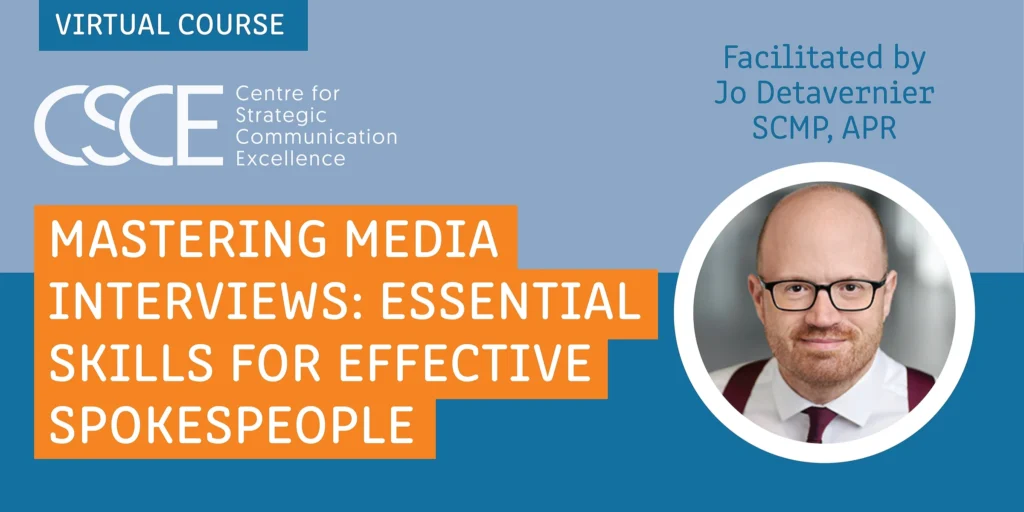Just over six months ago, the Centre for Strategic Communication Excellence (CSCE) released the 2018 Communicating Artificial Intelligence (AI) survey results. Time stands still for no one, and in this crazy world of technology on steroids, the additional insights we’ve gathered are surprising. With the rich data collected in the 2019 Communicating Artificial Intelligence survey, communication professionals will build the playbook for communicating AI.
The 2019 results suggest it’s still far too early to identify best practices or consistent strategies when it comes to communicating about AI. The survey did identify what’s underway in organisations already communicating about AI and what can be done in an informed and decisive way. Stepping up to the plate and being valued as communication professionals and indeed as a profession is essential and the opportunity is immediate if we intend to keep pace with our role in a rapidly changing environment.
Some tough questions about our capabilities, our position as strategic advisors, and how we are adopting AI tools are waiting for answers. Ever mindful that different perspectives bring a wealth of different insights, I reached out to some strategic communication thought leaders, asking for their personal take on where our profession is heading with companies and consumers on a fast track to adopt AI.
The time to step up is now
There is no time like the present as they say, but are we already too late? Ginger Homan, Chair of IABC and the IABC Foundation, our research partner, suggests we have a choice and must choose wisely to step up now as advisors to our organizations.
“Too many of us seem to be waiting for our leadership team to bring this topic up. As advisors, we need always to be exploring what is on the horizon and take that to our leaders.
This research is a wakeup call to those who think artificial intelligence will not impact them or will be of little concern. As advisors, how should our organisations respond to AI? How should we incorporate it into our business model and what do we need to do to prepare employees?
This fourth-industrial revolution gives us a choice. We can choose to ignore it and not be relevant to the conversations happening, or we can choose the future and prepare our organizations. This research gives us a wonderful opportunity to learn from those who are already leading the way.
We know from previous studies that just focusing on the rational, will not inspire a transformation. As we develop the playbook for communication professionals, we need to move our profession into action. We need to be active in laying out the burning platform. Each organization will be different, but the motivation to change has to be there. We need to take a deeper dive into the ethics and morality piece. How are ethics being considered as an organization incorporates AI into their model? What “ethics” are they considering? What role do communication professionals need to play in facilitating that conversation? It’s time to motivate and start taking action.”

Ginger Homan ABC, SCMP Tulsa, USA
Similarly, Dr Anne Gregory, who is Past Chair of the Global Alliance for Public Relations and Communication Management, CIPR AI Panel member, and a leading light in our profession on driving communication capabilities, sees the opportunities and challenges that AI brings to our profession.
“AI represents one of the great opportunities for strategic communication professionals. Organisations are what they communicate and what others say about them. Now that AI will become part of the very DNA of how we work and how we communicate, it is absolutely essential that communication professionals are there offering guidance on how those AI agents are instructed, used, and monitored. This report shows that as many professionals are observing AI as are being involved. We must get involved as the strategists who develop and guide this powerful technology so that it is used as an instrument for good in our organisations.”

Dr Anne Gregory PhD Huddersfield, UK
Sia Papageorgiou, Director with Cropley Communication, CSCE faculty member, and current IABC Victoria President, was instrumental in driving both the 2018 and 2019 surveys. She notes that if we are truly operating at the strategic advisor and business leader levels, we have an obligation to take the lead within our organisations.
“A future dominated by artificial intelligence is promising, but it seems not everyone is ready to welcome AI with open arms, least of all communication professionals. As the voice of an organisation, we have an obligation (at least those of us who believe we are strategic advisors and business leaders), to proactively create awareness and understanding of our organisation’s view of AI and its impact on its products and services. And it seems the majority of survey respondents agree with 84% believing AI allows communication professionals to provide significant value to the organisation. The same number feel that communication professionals should advocate adopting AI tools in their communication activities.
So, what are you waiting for? This important research has unearthed a number of topics, approaches and practices we can all use to launch AI communication in our respective organisations. Let’s use it as a reference point to make sure we communicate in an informed, decisive way, and we make that impact positive.”

Sia Papageorgiou FRSA, SCMP Melbourne, Australia
Jo Curkpatrick, a partner with Better Communication Results in Australia, is spot on when she says AI is now old news.
“We really do need to step up to the plate, because as the report shows, AI is there in our organisations, on the ground. It’s almost ‘old news’. As communication professionals, we need to move on from thinking about it. We need to do. We need to be communicating about AI, providing strategic advice, and guiding employee and stakeholder engagement. But we also need to be active in communicating with AI, ensuring ethical, unbiased, and trustworthy communications, keeping an eye on what AI is doing to our brand and voice.”

Jo Curkpatrick SCMP, MPRIA, GAICD Adelaide, Australia
The challenges are great
Stephen Waddington. Chair of the CIPR AI Panel in the UK shares many great resources on his blog. Stephen observes the gaps in capabilities. He crowdsources the tools that communication professionals are using in his blog. I encourage you to share this important resource, as we face the capability challenge together.
“Communication professionals recognise the need to communicate about AI on behalf of the organisations that they serve. Data and machine intelligence are finding application in almost every industrial sector and operational area of an organisation.
Internal and external communication and all forms of media are being impacted by AI. Indeed, professional communicators also recognise the potential of AI to support their communication workflow, eliminating administrative tasks and enabling them to work more effectively.
However, there’s a significant knowledge gap between awareness, understanding, and confidence in communicating and utilising AI. It’s crucial that communication professionals address this gap through education if they want to remain relevant to their organisation and benefit from AI in their own practice.”

Stephen Waddington Chart.PR, Hon FCIPR Chair, CIPR #AIinPR panel, London, UK
The challenges are not limited to communication as a function. They reach far into the organisation highlighting even more reasons we have to be at the table. Lee Hopkins, a partner with Better Communication Results, explains.
“A considerable number of communication professionals are letting marketing functions dictate what is going to happen around AI in the organisation. This is good if the comms pro is sitting within marketing and actively contributing to the conversation. But this is bad if, like happened with social media, the comms pro is outside of marketing. Wherever the professional sits, active involvement in the decision-making process is key. Having a point of view about the tone of voice of AI initiatives, how AI is rolled out to the organisation, how any retraining or reskilling, or redundancy, is going to be handled is of fundamental importance. If you’re sitting outside of marketing or in marketing but not invited to the conversation, get yourself invited. Work your political skills to make sure your voice is heard around the table. Now is not the time to be shy and humble. Now is the time to quite rightly have a say in how AI will impact your organisation. Work with your colleagues in HR, marketing, operations and the Centre of Excellence. Go for it!”

Lee Hopkins Adelaide, Australia
No greater challenge is apparent than the impact of AI itself because it’s a big change. It would be easy to focus on what we know and are comfortable with. As Jane Mitchell, a CSCE faculty member in London, UK suggests, especially in a noisy AI landscape.
“I am connecting dots which is making me question whether there is still uncertainty over what AI means to organisations, ergo communication professionals, particularly for the future. There is unquestionably a LOT of noise around AI, but it is a huge, global trend – perhaps too big for most of us to easily assimilate and translate. The impact of that might be that communicators focus on the ‘easier’, rational messages, and steer clear of the emotional. A huge majority communicate with customers and a tiny percentage (15%) to employees.
We know, as with all change and transformation it is not the logical that engages us, it is fundamentally the personal connection we feel to that change. If communicators are not feeling it themselves, they are most likely to stick to what they know focusing on the delivery of tactical messages to those who need it most. I would venture that senior communicators should take a step back, take a longer, broader look at the AI phenomenon, and have the courage to truly advise and lead. Daniel Kahneman puts this dilemma rather neatly in Thinking, Fast and Slow . . . ”We are . . . Prone to an illusion of control. We focus on what we know and neglect what we do not know, which makes us overly confident in our beliefs.” The world of AI is moving fast, we owe it to ourselves and our organisations to understand and, yes, embrace its potential.”

Jane Mitchell FRSA London, UK
As Claire Watson, CSCE faculty member in Regina, Canada explores, we simply must get ahead of the curve, which may be our greatest challenge.
“Artificial intelligence heralds a new age of challenge and opportunity for communication professionals. For internal communication, change management is a necessity. Creating awareness and educating employees about what it is and why it’s important will have a profound impact on engagement and culture. For external communication, AI holds the promise of accelerating business agendas as smart cities, smart health care, smart cars and an endless list of consumer applications unfold. Can we really afford the communication risks of not being ahead of the curve?”

Claire Watson MC, ABC, APR Regina, Canada
Overcoming the fear is a challenge too; the mere mention of AI conjures up all sorts of doomsday scenarios, but there is only one fear as Tilottama Pillai who heads up on-demand training for the CSCE suggests.
“The survey shows that a lot of the communication around AI currently is about creating awareness, this is likely because people are still hearing AI and thinking ‘Terminator’. Most of us are using AI (or the benefits of it) every day without realising it. As communication professionals we need to accept that AI is here to stay and understand that it will make life a lot easier for us, clearing up time to do things that add value to the organisation. The only people who should be afraid are those that are unwilling to change and up-skill themselves to keep up with the changing times.”

Tilottama Pillai ABC Kualar Lumpur, Malaysia
And then there’s the question of ethics, noted by Martha Muzychka, a CSCE faculty member from Newfoundland and Labrador, Canada.
“We need to consider the ethical implications of using AI in our communication and business platforms. I think ethics and AI (especially whatever data its use collects; much like fishing draggers scraping the sea bottom to collect everything without a filter) need to be dealt with upfront and centre or else I think we will find, like social media, that door will be closed much too late.”

Martha Muzychka ABC, MC, IABC Fellow Newfoundland & Labrador, Canada
Let’s look toward the benefits
Dr Amanda Hamilton-Attwell, a senior communication professional in South Africa and CSCE faculty member explores the tremendous opportunity we have to seize the benefits of AI.
“The insights gained from this report should be taken seriously by the communication profession. Reading the report and discussing the topic with fellow professionals confirmed the lack of understanding about the benefit of AI for our profession. AI is not going to replace communication professionals as some may fear. In fact, if we seize the benefits of AI technology, it will make us indispensable. We need in-depth knowledge about AI, deep machine learning, algorithms, natural language programming, and the content that can provide. AI can create valuable content and we, as communication professionals, have the skills and knowledge to package and distribute knowledge. We must own the space or other functions will gladly occupy it.”

Dr Amanda Hamilton-Attwell, ABC, CPRC, IABC Fellow Pretoria, South Africa
When the survey asked questions against the Strategic Alignment Model below, it showed that 28% of communication professionals actively communicating about AI indicated developing key messages as their organisation’s most immediate priority. Another 24% selected identifying the business need and 12% chose setting objectives or to determine tactics.

It was interesting to note that 75% of those active in communicating about AI are engaged in both planning (strategic) and execution (tactical) AI communication activities, spending roughly half their time in each area. The balance needs to change. Global thought leaders say it’s time to step up to the challenge and the only way we can do that, is by embracing AI and exploring ways it can help us let go of some of the tactical execution. Communication professionals need to spend more time and energy working on the strategic communication elements, such as working more closely with stakeholders, defining key messages, and business needs so we can take our place as strategic advisors.

Mary Hills, ABC, Six Sigma, IABC Fellow from Heimann Hills Marketing Group Chicago, USA, was the research partner for this survey and is a CSCE faculty member. Mary has the final word on this phase of the research.
“The CSCE Communicating AI Survey: Building the Playbook 2019 has actionable steps from colleagues who are doing and observing AI communication now. In particular, communication in action insights offers communication professionals a great launch point for AI communication. Special thanks to colleagues who shared their experiences to make us all the better at what we do.”
Over 50% of survey respondents feel that communication professionals are not ready or able to lead organisational AI communication and 63% feel the communication industry isn’t preparing professionals for a leadership role in AI communication. Therefore the insights gained from the 2018 and 2019 studies will inform the second part of this research, with global focus groups and reviews from various industry papers compiled into a playbook for communication professionals. The AI playbook will be released later this year. I invite you to get involved wherever you can.





